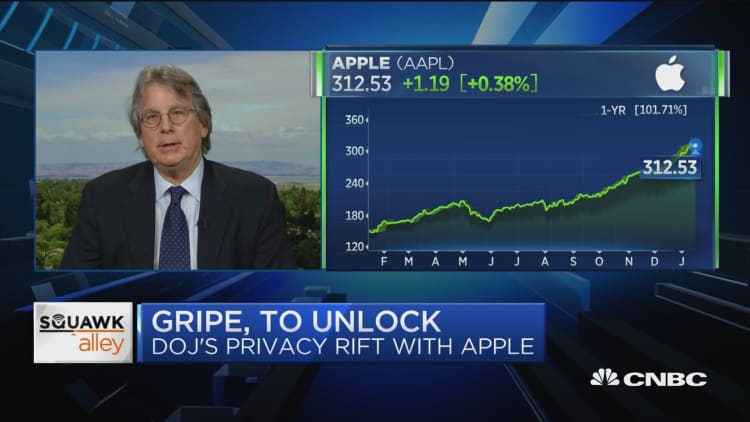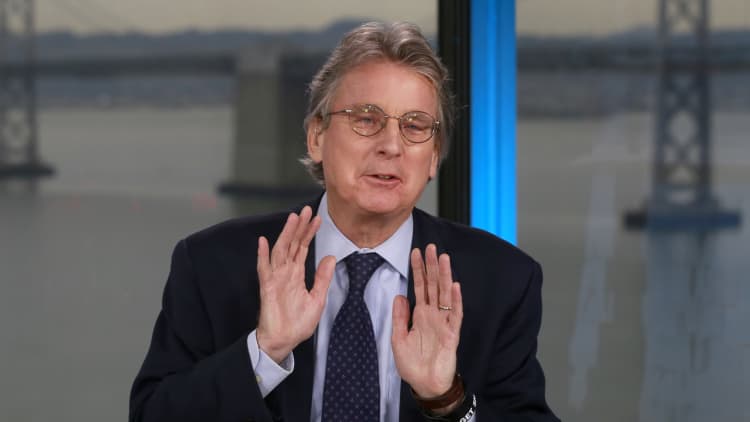
Apple is right to refuse Justice Department requests to unlock iPhones belonging to the suspect in a December Navy base shooting, Roger McNamee told CNBC on Thursday.
"If they create a backdoor for law enforcement, they're effectively creating a backdoor for everyone," including criminals, the online privacy activist said on "Squawk Alley." "It also means the government of China, the government of Russia, are going to have much easier abilities to penetrate phones and that raises the threat to every user of smartphones."
McNamee invested in Amazon in the 1990s and later co-founded private-equity firm Elevation Partners, which invested more than $200 million in Facebook a few years before the social network's 2012 initial public offering.
However, in recent years, he has increasingly spoken out about Facebook and warned about the perils of what he calls "surveillance capitalism," a problematic phenomenon he attributes to the rise of Big Tech.
Last year, McNamee published a book titled, "Zucked: Waking Up to the Facebook Catastrophe." In 2018, he also helped launch the Center for Humane Technology, a nonprofit aimed at combating tech addiction.
While frequently dinging Facebook over its handling of user data, he's generally heralded Apple as a lodestar on issues of user privacy, and he's rejected claims that he is a "shill" for the company.
"Not everything at Apple is perfect," he told The New Yorker in a December profile. "But on the privacy thing Tim Cook is really walking the walk." Cook is CEO of Apple.
McNamee's warning about smartphone backdoors creating a slippery slope comes two days after President Donald Trump slammed Apple for refusing to help the FBI to unlock the iPhones of the suspected shooter at Naval Air Station Pensacola that left three Americans dead last month.
Earlier this week, Attorney General William Barr claimed the Cupertino, California-based company had not provided "substantive assistance" in unlocking the alleged shooter's two iPhones.
Apple responded by saying it had provided gigabytes of information to the authorities in connection to the Florida case. But it said it would stand its ground and not build a "backdoor" or specialized software to give law enforcement elevated access.
"We reject the characterization that Apple has not provided substantive assistance in the Pensacola investigation. Our responses to their many requests since the attack have been timely, thorough and are ongoing," Apple said in its statement.
Apple was involved in a showdown with the FBI in 2016, when the Justice Department sued to gain access to a phone used by Syed Farook, who was responsible for the mass shooting in San Bernardino, California, that left 14 people dead. The standoff ended when the FBI found an unidentified private vendor to crack the phone's security.
McNamee said the Justice Department's argument for Apple to unlock the devices of the suspected Pensacola shooter was "very weak," claiming there's little on the phones that law enforcement couldn't obtain through other means.
"We live in this time of surveillance capitalism. Everything you do on your phone touches the network in some way," he said.
"To the extent that they're trying to track who did this shooter meet, where was the shooter at any point of time ... all of that stuff exists out in the environment," he added. "It's easily accessible to law enforcement with a warrant."
While there may be some things such as photos on the phone that cannot be access any other way, "as a generalization, I think Apple's position on this is exactly correct," McNamee concluded.

— CNBC's Kif Leswing contributed to this report.


